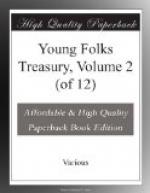The Blind Man put out his hands again to feel how much his friend had kept; but in front of the Deaf Man lay only a very small heap, no larger than what he had himself received. At this he got very cross, and said: “Come, come, this won’t do. You think you can cheat me in this way because I am blind; but I’m not so stupid as all that, I carried a great bundle of treasure, you carried a great bundle of treasure, and there were two great bundles on the Donkey. Do you mean to pretend that all that made no more treasure than these two little heaps! No, indeed; I know better than that.” “Stuff and nonsense!” answered the Deaf Man. “Stuff or no stuff,” continued the other, “you are trying to take me in, and I won’t be taken in by you.” “No, I’m not,” said the Deaf Man. “Yes, you are,” said the Blind Man; and so they went on bickering, scolding, growling, contradicting, until the Blind Man got so enraged that he gave the Deaf Man a tremendous box on the ear. The blow was so violent that it made the Deaf Man hear! The Deaf Man, very angry, gave his neighbor in return so hard a blow in the face that it opened the Blind Man’s eyes!
So the Deaf Man could hear as well as see, and the Blind Man could see as well as hear! This astonished them both so much that they became good friends at once. The Deaf Man confessed to have hidden the bulk of the treasure, which he thereupon dragged forth from its place of concealment, and having divided it equally, they went home and enjoyed themselves.
HARISARMAN
There was in a certain village, a certain Brahman named Harisarman. He was poor and foolish and unhappy for want of employment, and he had very many children. He wandered about begging with his family, and at last he reached a certain city, and entered the service of a rich householder called Sthuladatta. His sons became keepers of Sthuladatta’s cows and other property, and his wife a servant to him,




